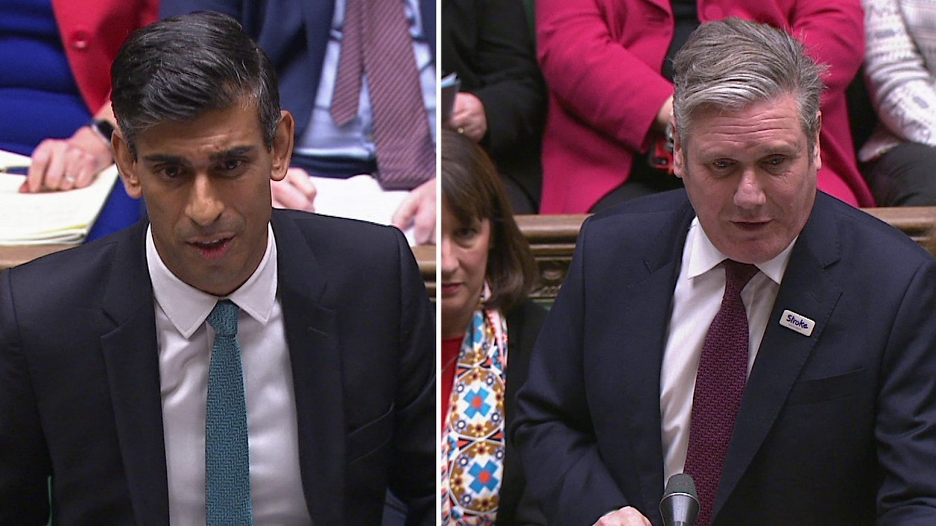Time’s Up for UK Conservatives

Image Courtesy of BBC
By John Maggio
This is an independently submitted op-ed for our Quill section. Views and statements made in this article do not necessarily reflect the opinions of The Tower.
British Prime Minister Rishi Sunak is facing declining poll numbers and a divided Conservative Party. Under his unelected leadership, the Labour Party may finally be able to bring an end to the 13-year long ruling of the Conservative Party. While leadership under the Labour Party during this time has been unable to find a suitable alternative, Labour has rallied around their current leader Keir Starmer with a hopeful chance of taking No. 10 Downing Street.
The United Kingdom has been run by the Conservatives since 2010 when PM David Cameron formed a coalition government with the Liberal Democrats (often shortened to Lib Dems). The Lib Dems are a smaller center-right party that has not held the top office in its history, but often plays a decisive role in UK Parliament and elections. In the 13 years since then, the Tories (a term used to call the Conservative Party) have time and time again been unable to keep up with domestic and global challenges.
Since 2010, the UK has had three general elections (2015, 2017, and 2019) and five PMs, with three three resigning and two not being elected by the British people. While the Conservatives have been in power, the country has faced Brexit, an isolationist America under President Trump, the COVID-19 pandemic, a lockdown party scandal bringing down a PM, disputes with the EU, rising rates of immigration and inflation, and the largest war on the European continent since WWII.
The problems for the Conservatives do not just come from domestic and international issues. Each party holds Party Conferences to bring voters and politicians together to bring up the issues of the day. More often than not, the party in power is able to have a sense of unity at their conference given they have control of Parliament and can show the electorate their united stance. When a party is out of power, there is often a fractured environment with factions trying to compete for the leadership of the party in order to face the ruling party. This flipped in 2023.
The Tory Conference was divided between the more right-wing of the party led under former PM Liz Truss versus the leadership of the more centered PM Sunak. The Conservative Party Conference was plagued by issues that brought light to their dysfunction, including the leaked story before the conference of the high speed rail line known as HS2 being canceled, key members of the government giving speeches to near-empty rooms, and a proposed smoking ban having split views inside the party. The Tories continue to copy their Republican Party counterparts in the US by continuing to platform against cultural issues instead of tackling the real problems of the day.
This is compared to the Labour Party Conference, where the opposition party was united under the leadership of Starmer. While his speech started off with a protester throwing glitter on him, this did not take away from the shining light of Labour’s vision.
Starmer promised the UK as a reformed Labour Party.
“Together we fix tomorrow’s challenges today and, conference, this new path can only be walked by a new party, a changed Labour Party,” Starmer said. “No longer embroiled to jester politics, no longer a party of protest, a party of service. Rebuilted, renewed, reconnected to an old partnership, a bargain, that we serve working people.”
While it may seem that British politics should only be concerning those an ocean away, this could be telling of the coming election here in the US. In contemporary political history for the two nations, there has been a long-running aligning of their political leanings.
Margaret Thatcher was elected PM just one year before her American counterpart Pres. Ronald Reagan, having a relationship described as “political soulmates.” The late-90s saw Pres. Bill Clinton’s Third Way and PM Tony Blair’s New Labour. Pres. Donald Trump and PM Boris Johnson each led their countries in the late-2010s with glaring similarities: blond, boastful, and polarizing.
While Pres. Biden is facing a high disapproval rating from the public, a divided GOP will only plague the Republicans until November 2024. Former Pres. Trump is by far the favorite for the Republican nomination, having a candidate facing multiple indictments may be a line in the sand for too many voters. It may be possible to see the UK-US political pendulum swing back to the left in 2024.







